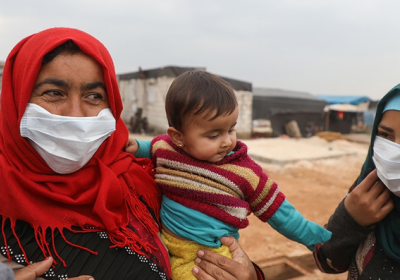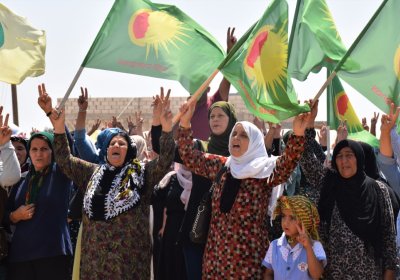The people of North and East Syria — a region commonly known as Rojava — are facing increased risk of contracting COVID-19 due to its rapid spread in neighbouring countries, writes Kerry Smith.
Northern Syria
The region of Rojava in Northern Syria, which cares for millions of civilians with less money and resources than virtually any other state on the planet, is on the verge of a catastrophe, reports Syrian Democratic Times.
Turkish president Recep Tayyip Erdogan met Russian President Vladimir Putin in Moscow on March 5, where they agreed on a plan for a ceasefire in Syria’s Idlib province, writes Chris Slee.
While Turkey and Greece have turned refugees away from their borders, Peter Boyle reports that the revolutionary Autonomous Administration of North and East Syria (better known as Rojava) has welcomed refugees from war-devastated Idlib province in Syria.
There are currently two wars being fought in northern Syria, writes Chris Slee.
Turkish forces have invaded Rojava — the Kurdish-majority multi-ethnic territory of the Autonomous Administration of North and East Syria (AA). In a telephone call to Turkey’s authoritarian President Recep Tayyip Erdogan, United States president Donald Trump gave the invasion a green light.
The people of Rojava in Northern Syria are continuing human shield actions along the Syria-Turkey border, to prevent an invasion of the region by the Turkish state.
A human shield action in the border village of Qeremox, located to the east of Kobane has been continuing for more than 40 days.
The human shields come from Kobane Canton. Representatives of political parties and civil society organisations in the region are paying solidarity visits to the actions.
In the border region of Serekaniye, a human shield action has been continuing for more than 18 days.
Ecology — together with democratic confederalism and women’s liberation — is an essential pillar of the Rojava Revolution. What is happening in Rojava is about more than just protecting nature by limiting damage to it; it is about reestablishing the balance between people and nature.
July 19 marked the seventh anniversary of northern Syria’s Rojava Revolution. On that day in 2012 the nascent People’s Protection Units (YPG) took control of the Kurdish-majority city of Kobanê. The outnumbered forces of Syrian dictator Bashar al-Assad surrendered and were allowed to depart (without their weapons). Other Kurdish cities and towns in the north were soon liberated as well.
Since the liberation of the last of the ISIS-occupied territory this year, the self-administered areas of northern and eastern Syria set up by the liberation forces have enjoyed secure and stable conditions. However, they have been denied representation in the international negotiations to resolve the Syrian crisis, write Ismet Tashtan and Peter Boyle.
Turkish troops fired across the border on November 1, killing a six-year-old girl in the northern Syrian village of Til Findir.
The murder was part of a pattern of harassment by the Turkish army against the Democratic Federation of Northern Syria (DFNS). The DFNS is a liberated area administered by democratic local councils, with equal representation of men and women and the inclusion of ethnic and religious minorities.
- Previous page
- Page 2










